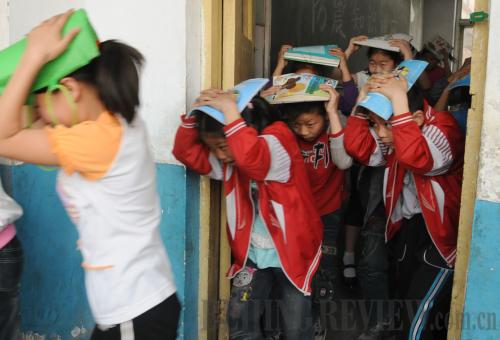|
 |
|
LIFE EXERCISE: Students come out of a classroom in queue during an earthquake evacuation drill at a school in Xingtai County, north China's Hebei Province on May 12 (GONG ZHIHONG) |
Drill or Playacting?
A middle school in Kunming, southwest China's Yunnan Province, held an earthquake evacuation drill last month but, strangely, students were only allowed to use two flights of stairs while the other six were left for leaders to observe. Students were in danger of being trampled numerous times.
Once a drill turns into playacting, it nears another disaster. In the case of a devastating quake, students will tend to take the course they took in the drill. If they do, the consequence will be disastrous as they spent 10 minutes making their way from the fourth floor to the ground floor. However, the students will not be able to survive any earthquake unless they can finish the process in 2 minutes.
In this evacuation drill, students were restricted to crowded stairs and the safest and most convenient passages were reserved for leaders. This wasn't an evacuation drill but rather a show for the leaders.
Most school evacuations nowadays are conducted without special technical instructions or planning. In most cases, it's nothing but a formality. If this situation remains, what will happen when a real disaster hits?
Workers' Daily
Disgraceful Culture
The Wangjing outlet of Japanese retailer Ito-Yokado in Beijing recently decided if an employee makes mistakes, apart from being fined, he or she has to stand in the staff hallway for 20 minutes and bow to other staff the following week. The store labels this practice a kind of "corporate culture." Some workers rejected the rule and resigned.
Businesses do need a set of rules to standardize employee behavior. But the Wangjing outlet of Ito-Yokado is going too far, because it is insulting employees' dignity.
The objective of any "corporate culture" should be to encourage employees to love their work and cooperate better with others so as to strengthen the company's competitiveness. Around the world, successful businesses are all examples of respect for employees and have their ambience people-centered.
Scandals of offending a worker's basic rights and dignity happen frequently in China because of shortsighted bosses, and also the underdeveloped corporate management system and low level of social and economic development. Some businesses even try to strengthen competitiveness by encroaching on employee rights.
Given the recent serial suicide attempts in the south China plant of Foxconn, the Taiwan-based world's largest electronic contract manufacturer, some enterprises do have serious problems not only in their corporate systems, but also in their culture.
Beijing Times
Reliable Help
The number of court cases against local governments has risen sharply in recent years.
Many of the people who filed lawsuits asked to stop local governments from evicting them from their homes to make way for commercial real estate projects. In some cases, local governments forced farmers to sell their land to them at giveaway prices and then resold them to developers for sky-high prices.
However, many people lost the lawsuits against the government and were forced to turn to higher-level governments for help.
Local officials then tried every means possible to prevent the people from petitioning higher-level governments, including declaring them mentally challenged and putting them in asylums.
The Supreme People's Court, the highest judicial organ in China, has announced the launch of a campaign from May 22 to the end of the year to deal with cases involving people suing government agencies. It's the right time to give full play to the role of judicial supervision in tackling the problems from the very beginning.
Zhujiang Evening News
Wasted Efforts
In the past three years, Shenzhen in south China's Guangdong Province has spent 500 million yuan ($60 million) on cleaning up a local river but achieved little.
This is only one of the many failures of this kind. It's reported the disappointing cleanup campaigns for Dianchi Lake in Yunnan Province and Taihu Lake in Jiangsu Province cost 4.6 billion yuan ($673 million) over 13 years and more than 10 billion yuan ($1.5 billion) over 16 years, respectively.
The efforts to control water pollution in Taihu were doomed, experts said, though the financial input was huge. The solutions used to try to clean up Taihu and many other lakes and rivers around the country lag behind current world levels by nearly 50 years. The reason is simple: It is more profitable to parties involved in the cleanup campaigns.
We have always blamed slow progress in eliminating pollution sources and an inefficient, redundant management system for China's disappointing pollution control performance. Corruption also costs us our valuable resources in environmental conservation.
China Youth Daily
| 